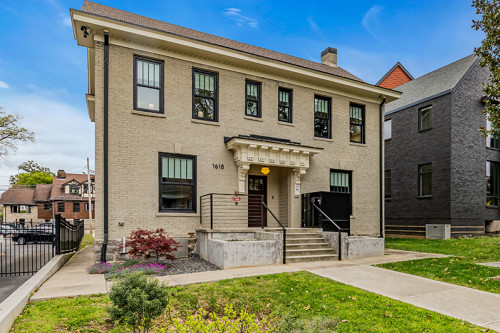






Live Again Detox Center
Treatment Focus
This center primarily treats substance use disorders, helping you stabilize, create relapse-prevention plans, and connect to compassionate support.
Primary Level of Care
Typically the initial stage of treatment for substance use, focusing on medically supervised management of withdrawal symptoms
Claimed
Recovery.com has connected directly with this treatment provider to validate the information in their profile.
Treatment Focus
This center primarily treats substance use disorders, helping you stabilize, create relapse-prevention plans, and connect to compassionate support.
Primary Level of Care
Typically the initial stage of treatment for substance use, focusing on medically supervised management of withdrawal symptoms
Private Pay
You pay directly for treatment out of pocket. This approach can offer enhanced privacy and flexibility, without involving insurance. Exact costs vary based on program and length of stay. Contact the center for specific details.
Live Again Detox Center
Live Again Detox Center
About Live Again Detox Center
Live Again Detox Center, located in the heart of Nashville’s innovative Music Row, provides a safe and medically monitored detox process from drugs and alcohol in a comfortable home-like environment. After a thorough initial assessment, clients are given an individually tailored care plan, which may include the use of medication-assisted treatment (MAT), and coordination or referrals for ongoing care.
Comfort and Safety
A compassionate and experienced team works with clients to ensure their safety and wellbeing throughout the uncomfortable and oftentimes dangerous withdrawal process. Newly renovated, their Nashville home offers en-suit, private bathrooms in each room, with 12-inch memory foam mattresses, and a layout meticulously designed for the utmost comfort. In addition to regular physical and mental check-ins, personalized detox strategies may involve the use of medications used to ease withdrawal symptoms and combat cravings. Their program is equipped to assist clients through detox and the first phase of their recovery from substances such as adderall and amphetamines, benzodiazepines, cocaine, fentanyl, heroin or other opioids, cocaine, marijuana, and more.
Ongoing Care Coordination
Live Again helps clients secure ongoing treatment and recovery resources as they’re nearing the end of their detox process, offering referrals and coordination for additional care in a residential, outpatient or sober living, or therapeutic program. Deeply connected within the Nashville medical community, their team assists clients in establishing a local care team with psychiatrists, counselors, addiction specialists and more. Live Again Detox Center strives to give clients the clean slate necessary to break free from the physical holds of addiction, and address the underlying causes to maintain long-term recovery.
Center Overview
Treatment Focus
This center primarily treats substance use disorders, helping you stabilize, create relapse-prevention plans, and connect to compassionate support.
Pricing and Program Length
Estimated Center Costs
Center pricing can vary based on program and length of stay. Contact the center for more information. Recovery.com strives for price transparency so you can make an informed decision.
Levels of Care





Your Care Options
Specializations
Alcohol
Using alcohol as a coping mechanism, or drinking excessively throughout the week, signals an alcohol use disorder.
Drug Addiction
Drug addiction is the excessive and repetitive use of substances, despite harmful consequences to a person's life, health, and relationships.
Medication-Assisted Treatment
Combined with behavioral therapy, prescribed medications can enhance treatment by relieving withdrawal symptoms and focus patients on their recovery.
Who We Treat
Men and Women
Men and women attend treatment for addiction in a co-ed setting, going to therapy groups together to share experiences, struggles, and successes.
Approaches
Individual Treatment
Individual care meets the needs of each patient, using personalized treatment to provide them the most relevant care and greatest chance of success.
Medical
Medical addiction treatment uses approved medications to manage withdrawals and cravings, and to treat contributing mental health conditions.
Therapies
Medication-Assisted Treatment
Combined with behavioral therapy, prescribed medications can enhance treatment by relieving withdrawal symptoms and focus patients on their recovery.
Relapse Prevention Counseling
Relapse prevention counselors teach patients to recognize the signs of relapse and reduce their risk.
Substances We Treat
Alcohol
Using alcohol as a coping mechanism, or drinking excessively throughout the week, signals an alcohol use disorder.
Benzodiazepines
Benzodiazepines are prescribed to treat anxiety and sleep issues. They are highly habit forming, and their abuse can cause mood changes and poor judgement.
Chronic Relapse
Consistent relapse occurs repeatedly, after partial recovery from addiction. This condition requires long-term treatment.
Cocaine
Cocaine is a stimulant with euphoric effects. Agitation, muscle ticks, psychosis, and heart issues are common symptoms of cocaine abuse.
Drug Addiction
Drug addiction is the excessive and repetitive use of substances, despite harmful consequences to a person's life, health, and relationships.
Heroin
Heroin is a highly addictive and illegal opioid. It can cause insomnia, collapsed veins, heart issues, and additional mental health issues.
Methamphetamine
Methamphetamine, or meth, increases energy, agitation, and paranoia. Long-term use can result in severe physical and mental health issues.
Opioids
Opioids produce pain-relief and euphoria, which can lead to addiction. This class of drugs includes prescribed medication and the illegal drug heroin.





